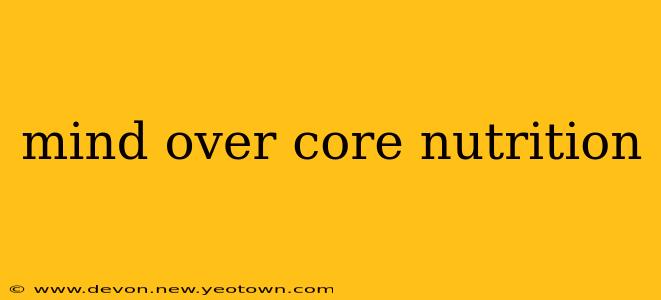We all know the importance of nutrition for physical health. A balanced diet fuels our workouts, repairs muscles, and keeps our energy levels up. But what about the connection between nutrition and our mental well-being? It's a powerful link, often overlooked, that significantly impacts our cognitive function, mood, and overall mental clarity. This is where the concept of "mind over core nutrition" comes in – a holistic approach that prioritizes the synergistic relationship between what we eat and how we think. This isn't about restrictive diets or quick fixes; it's about mindful eating choices that nourish both your body and mind, leading to a more balanced and fulfilling life.
What is Mind Over Core Nutrition?
Imagine this: You're feeling stressed, overwhelmed, and your concentration is shot. You reach for a sugary snack to provide a quick boost, but soon after, you experience an energy crash, leaving you feeling even worse. This scenario highlights the direct impact of nutrition on mental health. Mind over core nutrition takes a different approach. It involves consciously choosing nutrient-rich foods that support optimal brain function and emotional well-being. It's about understanding how specific nutrients influence your mood, focus, and cognitive abilities, and then making choices that reflect this knowledge. Think of it as proactive self-care, fueling your mind as diligently as you fuel your body for a marathon.
How Does Nutrition Impact Mental Well-being?
The connection between nutrition and mental health is complex but undeniable. Certain nutrients act as building blocks for neurotransmitters – chemical messengers in the brain that regulate mood, sleep, and cognitive function. A deficiency in these crucial nutrients can lead to a range of mental health challenges. For instance, a lack of omega-3 fatty acids has been linked to depression and anxiety, while low levels of B vitamins can affect cognitive performance and energy levels.
What are the best foods for brain health?
This is a frequently asked question, and the answer is multifaceted. A balanced diet is key, but some foods stand out for their brain-boosting properties. These include:
- Fatty fish (salmon, tuna, mackerel): Rich in omega-3 fatty acids, essential for brain structure and function.
- Leafy green vegetables (spinach, kale): Packed with vitamins K, C, and folate, crucial for cognitive health.
- Berries (blueberries, strawberries): High in antioxidants that protect brain cells from damage.
- Nuts and seeds (almonds, walnuts, chia seeds): Excellent sources of healthy fats, vitamin E, and magnesium.
- Dark chocolate (70% cacao or higher): Contains flavanols, which improve blood flow to the brain.
What role does gut health play in mental well-being?
The gut-brain axis is a fascinating area of research highlighting the intimate connection between your gut microbiome and brain health. Emerging evidence suggests that the bacteria in your gut can influence neurotransmitter production, impacting mood, stress levels, and even cognitive function. A healthy gut, therefore, is essential for a healthy mind. This can be achieved through a diet rich in prebiotics (foods that feed beneficial gut bacteria) and probiotics (live bacteria that improve gut health). Fermented foods like yogurt, kefir, and sauerkraut are excellent sources of probiotics.
How can I improve my diet to support my mental health?
Start by making small, gradual changes. Focus on incorporating more whole, unprocessed foods into your diet. Limit processed foods, sugary drinks, and excessive caffeine intake, all of which can negatively impact your mood and energy levels. Prioritize regular meals and snacks to maintain stable blood sugar levels, preventing those dreaded energy crashes. Hydration is also key; water is essential for optimal brain function. Consider keeping a food diary to track your eating habits and identify areas for improvement.
Are there specific supplements I should consider?
While a balanced diet is the best approach, some individuals might benefit from specific supplements. However, it's crucial to consult with a healthcare professional or registered dietitian before taking any supplements, as they can interact with medications and have potential side effects. They can help determine if you have any nutritional deficiencies and recommend appropriate supplementation strategies.
Mind over core nutrition isn't just about eating healthy; it's about establishing a mindful relationship with food, recognizing its impact on your mental well-being, and making conscious choices to support your overall health and happiness. It's a journey of self-discovery, leading to a more balanced and fulfilling life.

